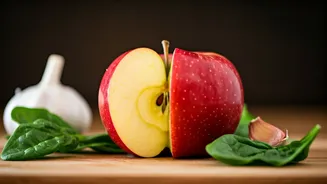Understanding Cholesterol Basics
Before diving into specific foods, it's crucial to grasp the basics of cholesterol. Cholesterol, a waxy substance found in your blood, is vital for building
healthy cells. However, high levels of LDL (low-density lipoprotein), often termed 'bad' cholesterol, can increase your risk of heart disease. Conversely, HDL (high-density lipoprotein), the 'good' cholesterol, helps remove LDL from your arteries. The foods you consume significantly impact your cholesterol levels, and certain choices can help reduce LDL and increase HDL. This foundational knowledge is key to understanding how the following dietary suggestions can help improve your overall heart health. Regular monitoring and consulting with a healthcare professional are essential for managing cholesterol effectively.
Oats: Heart-Healthy Powerhouse
Oats are a fantastic choice for anyone looking to lower their cholesterol naturally. Packed with soluble fiber, oats work by preventing cholesterol absorption into your bloodstream. This type of fiber forms a gel-like substance that binds with cholesterol in your digestive system, flushing it out of your body. A study showed that consuming 5-10 grams or more of soluble fiber daily can reduce total and LDL cholesterol. Incorporating oats into your breakfast routine is simple: add them to your cereal, smoothies, or even bake them into muffins. Oats are versatile and can be easily included in various meals to boost their cholesterol-lowering potential. Starting your day with oats can set a positive tone for your heart health journey, aiding in the reduction of high cholesterol levels.
Beans: Fiber-Rich Benefits
Beans are another excellent food for cholesterol management, offering a wealth of soluble fiber. Different types of beans, such as kidney beans, black beans, and lentils, all contribute to lowering cholesterol levels. Like oats, beans' soluble fiber binds with cholesterol in your digestive system, preventing its absorption. Beans also provide protein and take longer to digest, which can help you feel full longer and aid in weight management, a key factor in heart health. Adding beans to your diet can be straightforward: incorporate them into soups, salads, or as a side dish. Regular bean consumption can be part of a broader dietary approach to reduce LDL cholesterol and enhance overall cardiovascular well-being. Beans offer both nutritional benefits and practical uses in meal preparation.
Nuts: Heart-Friendly Snacking
Nuts, especially almonds, walnuts, and cashews, can be a great addition to a cholesterol-lowering diet. These nuts are rich in healthy fats, fiber, and other nutrients that can help reduce LDL cholesterol. They also provide essential vitamins and minerals, supporting overall health. It is important to remember that nuts are calorie-dense; therefore, portion control is key. A handful of nuts as a snack can provide significant benefits without significantly increasing calorie intake. Nuts are incredibly versatile and can be added to salads, yogurt, or enjoyed as a quick snack. Regularly including nuts in your diet can contribute to reduced LDL cholesterol and potentially improve your heart health, offering both enjoyment and nutritional value.
Fatty Fish: Omega-3 Power
Fatty fish, such as salmon, mackerel, and tuna, are an excellent source of omega-3 fatty acids, which can help lower triglycerides, a type of fat in your blood. Omega-3s can also slightly raise HDL cholesterol. These healthy fats are beneficial for overall heart health and can reduce the risk of heart disease. Aim for at least two servings of fatty fish per week to reap the benefits. Preparing fatty fish is simple: grill, bake, or pan-fry them for a delicious and nutritious meal. Including fatty fish in your diet can be a tasty and effective way to support your heart health, contributing to lower triglyceride levels and improved cholesterol balance. Incorporating fatty fish into your meals provides a delicious boost of omega-3s, promoting a healthier cardiovascular system.
Fruits and Vegetables: Colorful Defense
A diet rich in fruits and vegetables is crucial for overall health, including cholesterol management. These foods provide fiber, vitamins, and antioxidants, all contributing to healthy cholesterol levels. Certain fruits and vegetables, like apples, grapes, citrus fruits, and berries, contain soluble fiber that helps lower LDL cholesterol. They are also packed with antioxidants, which protect your body from damage. Aim for a variety of colorful fruits and vegetables daily to ensure you are getting a wide range of nutrients. Incorporate fruits and vegetables into every meal and snack. The more colorful your plate, the more health benefits you receive, supporting both your heart health and overall well-being. A diet high in fruits and vegetables is a delicious and effective way to manage cholesterol naturally.
Olive Oil: Heart-Healthy Choice
Olive oil, particularly extra virgin olive oil, is known for its heart-healthy properties. Rich in monounsaturated fats, olive oil helps lower LDL cholesterol while increasing HDL cholesterol. It also contains antioxidants, which provide further protection against heart disease. Using olive oil in your cooking and as a salad dressing can significantly contribute to a healthy diet. Be sure to choose extra virgin olive oil for the highest quality and most benefits. Olive oil is a versatile ingredient that can enhance the flavor of your meals while simultaneously promoting heart health. Regularly using olive oil as part of your diet can be a delicious and effective way to manage cholesterol levels and improve cardiovascular health. Incorporating it into your cooking is a simple yet impactful dietary change.













